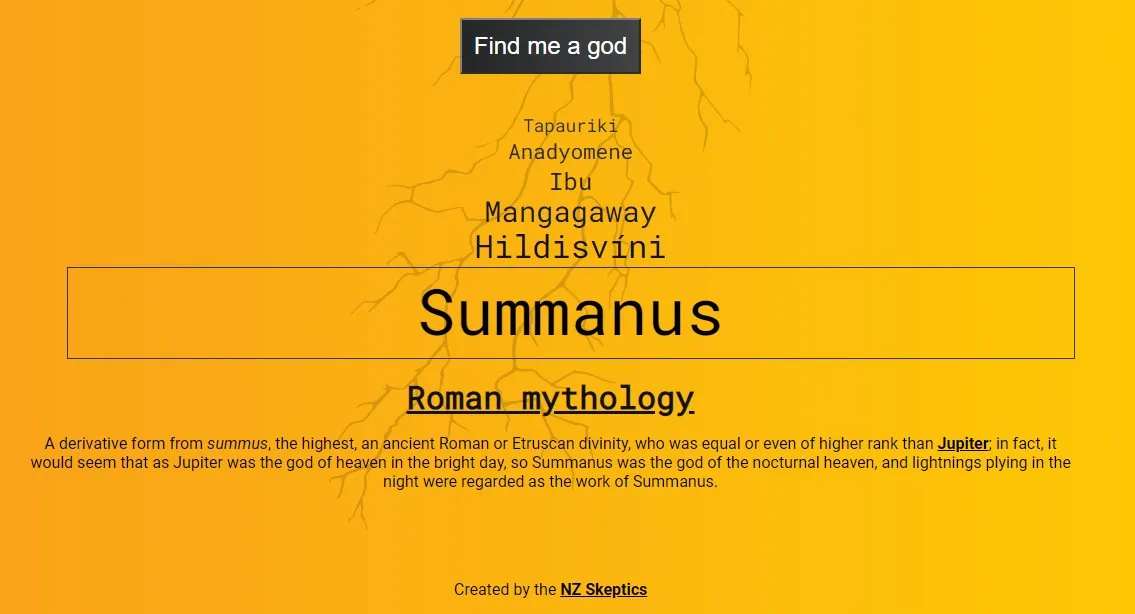Pick a God, any God
Mark Honeychurch - 12th September 2022
In the latest of my weird and wonderful ideas for websites that are fun and a little quirky, I’ve recently put together a page that has one simple purpose - to help you choose which god you should pray to when you next need something to turn out in your favour:

For fun, the site uses a real random number generator that relies (indirectly) on lightning strikes to generate randomness, which I figure works well with the idea of trying to discern god’s will. When you press the “Find me a god” button on the site, it scrolls through a list of gods before eventually stopping on the god that has been chosen for you, and then showing you a short summary of that god.
The list of gods has been borrowed from a site called the “Encyclopedia Mythica”, which has a lot of pages listing gods from several different cultures. I’m hoping that I can eventually find lists of other gods that aren’t featured on this site at the moment, such as Hindu gods - although the current list is already quite long, with 2,225 gods in it (of which some are entities other than gods that I’ve not managed to filter out yet - please let me know if you find something in the list like a river or a mere mortal!).
There is another, less obvious, reason for this site’s existence. I wanted a fun way to show the absurdity of belief in a particular god, especially given that there have been so many gods throughout history. I figured that a scrolling list of gods is a nice way to make it obvious just how many gods Man has invented over the years, especially when there are so many in the list that you’re unlikely to ever land on the same god twice. Maybe this list can help people to realise that the choice of any particular god as “the one true god” is somewhat arbitrary, given this rich history.
This site might also be used as a handy refutation to Pascal’s Wager, an argument that is still sadly used by Christians today as a way to claim the logic of believing in god. To over-simplify (as Christians mostly do with this argument), the wager imagines that there are four possible combinations of god belief:
- You don’t believe in god, and god doesn’t exist
- You do believe in god, and god doesn’t exist
- You don’t believe in god, and god does exist
- You do believe in god, and god does exist
Following these four possibilities “logically”, the argument goes that these are their possible outcomes:
- You live your life and die
- You waste some of your time believing in god, and then die
- You end up in eternal torment in hell
- You end up with an eternal reward in heaven
The argument goes that it’s better to believe than not to believe, as the outlay of believing is small compared to the massive heavenly reward you stand to receive, and it’s not worth the Sunday lie-ins you get for taking the risk of winning the booby prize of infinite punishment.
Pascal originally imagined the belief or lack of belief in god as a coin toss, and this makes it clear what the flaw in this argument is - the odds are being placed at 50/50. Of course, us skeptics who are atheists (which I imagine is most of us) would argue that the odds probably wouldn’t be 50/50, even if there was only one god we could believe in. But, in reality, there’s a lot more than just one idea of god that we’d need to choose between. If we gave each god an equal likelihood of being the one we need to worship in order to receive an eternal reward, and give atheism the same odds as each of these gods, the chance of picking the right god suddenly becomes pretty damn low!
So, the next time someone tries to tell you that you need to believe in “God”, go to god.skeptics.nz on your phone, press the button to spin the wheel of gods, and ask them which one they think you should believe in - if not the one that the site chooses for you, why not? Can they be sure that your new chosen god isn’t the real one, rather than the god they’ve chosen to believe in?